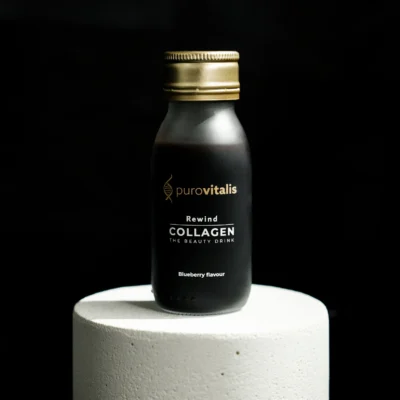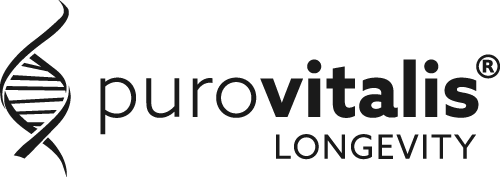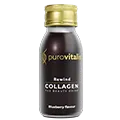
L-Ergothioneine is a unique compound and a powerful antioxidant that helps protect your body from oxidative stress—the kind of damage linked to aging and many chronic diseases. What makes it even more intriguing is that your body can’t produce L-Ergothioneine on its own. You have to get it through your diet, mainly from mushrooms and certain fermented foods.
Read more here: L-Ergothioneine food sources.
In this blog we’ll take a closer look at what makes L-Ergothioneine so interesting. Backed by research, we’ll explore its potential to protect long-lived cells, support brain health and immunity, and why some scientists even believe it could be the next longevity vitamin.
L-Ergothioneine: An old discovery with a new purpose
L-Ergothioneine was first identified in 1909, but for decades its exact function in the body remained unclear—even though it was known to occur naturally in foods like mushrooms.
Research took a new direction when scientists identified a specific transporter—SLC22A4, also known as OCTN1— responsible for absorbing and distributing L-ergothioneine in the body. Unlike most nutrients, L-ergothioneine relies on its own dedicated transport system, highlighting its potential importance in human health. Some studies suggest that its function increases around mealtimes, indicating that the body may be particularly prepared to absorb L-ergothioneine during or shortly after food intake.
Could L-Ergothioneine become the new longevity vitamin?
Scientists are now questioning whether L-Ergothioneine should be classified as a new essential vitamin with anti-aging properties. It meets several key criteria: it’s only available through diet, it uses a unique transport system in the body, and low levels have been linked to cognitive decline and chronic diseases. If formally recognised, it would be the first new vitamin added since B12 vitamin in 1948.
If you’re looking for a reliable L-Egothioneine supplier, our Liquid Collagen drink contains highest-grade L-Ergothioneine:
Benefits of L-Ergothioneine
As just mentioned – L-Ergothioneine is often referred to as the “longevity -vitamin” – and for a good reason. One of the key reasons lies in the anti-aging effect of L-Ergothioneine: its’ unique ability to protect long-lived cells—the types of cells in our body that renew themselves slowly or not at all. Because they stay with us for years, even decades, they are more exposed to gradual damage from oxidative stress and inflammation. This makes it especially important to protect them if we want to support long-term health and slow down aging processes.
These long-lived cells include some of the most vital parts of our body:
| Organ/System | Cell types | Function supported |
| Brain | Neurons and glial cells | Supports memory, concentration, and long-term brain function. |
| Eyes | Retinal pigment epithelial cells | Maintains clear vision and helps prevent age-related visual decline. |
| Skin | Keratinocytes and fibroblasts | Preserves skin elasticity, structure, and youthful appearance. |
| Bone marrow | Hematopoietic stem cells | Produces blood cells and supports immune defense. |
| Liver | Hepatocytes | Detoxifies harmful substances and regulates metabolism. |
| Kidneys | Tubular epithelial cells and podocytes | Filters waste, balances fluids, and regulates blood pressure. |
These long-lived cells are involved in some of the body’s most vital functions. Interestingly, L-Ergothioneine appears to specifically support these areas. Keep reading to learn how L-Ergothioneine helps protect your brain, eyes, skin, immune system, and much more.
Sharpen your mind with L-Ergothioneine
Our brain needs antioxidants to function optimally—especially as we age. L-Ergothioneine is one of the few antioxidants that can cross the blood-brain barrier, allowing it to accumulate in key areas of the brain. There, it helps protect neurons from oxidative stress and damage, which would otherwise accelerate the brain’s aging processes.
Research has shown a clear association between low levels of L-Ergothioneine and cognitive disorders. People with dementia, including Alzheimer’s and Parkinson’s disease, often have significantly lower concentrations of L-Ergothioneine in their blood compared to healthy individuals.
Research suggests L-Ergothioneine could delay cognitive decline
A 2021 cross-sectional study published in Free Radical Biology and Medicine investigated the link between L-Ergothioneine and brain health. The research included 496 individuals, divided into three groups:
- 88 healthy participants
- 201 with mild cognitive impairment
- 207 diagnosed with dementia (including Alzheimer’s and vascular dementia)
By analyzing blood samples, cognitive test results, and MRI brain scans, the researchers found that people with dementia had significantly lower levels of L-Ergothioneine. These lower levels were associated with brain shrinkage—especially in memory-related areas like the hippocampus—and damage to small blood vessels.
The study also observed increased breakdown of L-Ergothioneine in the dementia group, indicating higher oxidative stress in the brain. Researchers concluded that low levels may act as an early marker of cognitive decline, and that supplementation could be a potential strategy to support brain health.

L-Ergothioneine protects the eyes lens and cornea
L-Ergothioneine is also found in high concentrations in the lens and cornea – two of the most exposed and vulnerable parts of the eye. These tissues face constant oxidative stress from sources like UV radiation and environmental pollution. A 2021 study showed that the body actively transports L-Ergothioneine to these tissues, where it functions as a potent antioxidant. This suggests that L-Ergothioneine may help neutralize harmful free radicals, reduce the risk of UV-induced damage, and support overall eye clarity. These effects could be particularly relevant in relation to age-related eye conditions such as cataracts.
L-Ergothioneine skin benefits
A 2023 clinical trial investigated the effects of daily oral supplementation with L-Ergothioneine on skin health. Over a four-week period, 19 healthy participants took 25 mg of pure L-Ergothioneine per day. Skin changes were evaluated using the VISIA skin analysis system, focusing on key parameters such as pores, wrinkles, UV spots, brown spots, and porphyrins.
The results showed measurable improvements, including:
- Reduced pore size, with visible improvement already after two weeks
- Fewer wrinkles, especially around the eyes and cheeks
- Reduction in UV spots, suggesting protection against sun-induced damage
- Improved brown spot scores, linked to pigmentation and uneven skin tone
- Better porphyrin balance, indicating reduced bacterial activity and sebum regulation
- Overall improvement in skin clarity and texture after four weeks of supplementation
For extra skin support, Rewind Liquid Collagen Drink combines premium collagen, L-Ergothioneine, and other carefully selected ingredients to help maintain firm, radiant, and youthful-looking skin—from the inside out.
Related: Bovine Collagen Peptides: benefits, types and safety
Supporting the immune system from within
L-Ergothioneine is taken up by immune cells like monocytes and macrophages, where it helps protect them from oxidative stress. It also reduces inflammatory signals such as IL-8, which are often elevated during infections or chronic inflammation. High levels of L-Ergothioneine are found in bone marrow, where new immune cells are made. By protecting this environment, it helps support steady immune cell production—something that becomes even more important during illness, stress, or aging. Researchers have also linked the gene for its transporter to autoimmune diseases like Crohn’s and rheumatoid arthritis, suggesting a role in maintaining immune balance.
Realated: The link between vitamin D3 and the immune system
How L-Ergothioneine supports liver health
A 2024 study published in Lipids in Health and Disease found that L-Ergothioneine can help protect the liver in cases of MASLD—a common form of fatty liver disease linked to obesity and insulin resistance. In both mice and human liver cells, L-Ergothioneine reduced fat accumulation, inflammation, and oxidative stress, while also improving insulin sensitivity. These benefits were associated with increased autophagy—a natural cellular process that helps clear out damaged components and restore balance. With no approved medical treatments for MASLD, the findings suggest that L-Ergothioneine could offer nutritional support for liver health alongside lifestyle changes.
Related: Spermidine and autophagy: Everything you need to know
Protecting kidney health with L-Ergothioneine
The kidneys are exposed to constant oxidative stress due to their role in filtering blood and maintaining balance in the body — a strain that increases with age or chronic illness.
A recent study using a mouse model of cystinuria found that long-term treatment with L-Ergothioneine significantly reduced the formation of kidney stones and delayed their onset. Even more importantly, the treatment improved overall kidney health: glutathione levels were restored, and mitochondrial function improved.
These results suggest that L-Ergothioneine may help protect kidney tissue, support energy production in the cells, and maintain healthy kidney function over time.
Conclusion: Why L-Ergothioneine matters for healthy aging
L-Ergothioneine may not yet have the official status of a vitamin, but science is catching up. With its selective absorption system, ability to reach sensitive tissues like the brain and eyes, and proven antioxidant effects, it plays a unique role in protecting the body from age-related damage. Whether it’s supporting memory, skin clarity, immune resilience or liver function, L-Ergothioneine stands out as a promising compound for anyone focused on long-term health and vitality.
As research continues, the question may not be if we need more L-Ergothioneine in our diets—but how soon we can make it part of a smarter approach to aging well.
References
- Tian, X., Thorne, J. L., & Moore, J. B. (2023). Ergothioneine: An underrecognised dietary micronutrient required for healthy ageing? British Journal of Nutrition, 129(1), 104–114.
- Wu, L.-Y. et al. (2021). Low plasma ergothioneine levels are associated with neurodegeneration and cerebrovascular disease in dementia. Free Radical Biology and Medicine.
- Cheah, I. K., & Halliwell, B. (2021). Ergothioneine; antioxidant potential, physiological function and role in disease. Biochimica et Biophysica Acta (BBA)-Molecular Basis of Disease, 1867(8), 166067.
- Zhang, C., & Li, Y. (2023). Efficacy of Oral Administration of Ergothioneine (DR. ERGO™) on Skin Health Improvement: A Single-Center, Open-Label Clinical Study. Biomedical Science and Research.
- Paul, B. D., & Snyder, S. H. (2010). The unusual amino acid L-ergothioneine is a physiologic cytoprotectant. Cell Death and Differentiation, 17(7), 1134–1140.
- Lv, X., Nie, C., Shi, Y., Qiao, Q., Gao, J., Zou, Y., Yang, J., Chen, L., & Hou, X. (2024). Ergothioneine ameliorates metabolic dysfunction-associated steatotic liver disease (MASLD) by enhancing autophagy, inhibiting oxidative damage and inflammation. Lipids in Health and Disease, 23, 395.
- Mayayo-Vallverdú, C., López de Heredia, M., Prat, E., González, L., Espino Guarch, M., Vilches, C., Muñoz, L., Asensi, M. A., Serra, C., Llebaria, A., Casado, M., Artuch, R., Garrabou, G., Garcia-Roves, P. M., Pallardó, F. V., & Nunes, V. (2023). The antioxidant L-ergothioneine prevents cystine lithiasis in the Slc7a9−/− mouse model of cystinuria. Redox Biology, 65, 102801.

Experience the best of Collagen with Purovitalis liquid formula. Try it out!














